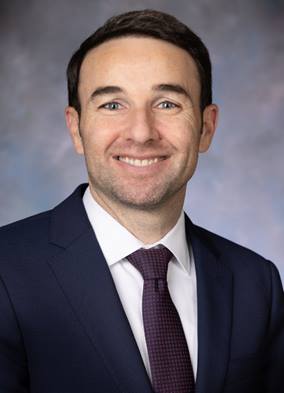We are incredibly proud to highlight Dr. Gabriel Cara Fuentes, our NephCure Specialist of the Month for June. This initiative recognizes the outstanding contributions of NephCure Specialists to the field of nephrology, spotlighting their work, projects, accomplishments, and valuable advice to the rare kidney disease (RKD) patient community.

Gabriel Cara Fuentes, MD, PhD, is a pediatric nephrologist and director of the Glomerular Disease Clinic at Nationwide Children’s Hospital. He is an assistant professor of pediatrics at The Ohio State University and a principal investigator at the Kidney and Urinary Tract Center. Dr. Cara Fuentes earned his medical degree from the University of Granada Spain and completed his pediatric residency training at Torrecardenas Hospital in Spain and at the University of Florida. His clinical interests include glomerular diseases such as nephrotic syndrome, MCD, FSGS, IgAN as well as other proteinuric kidney diseases such as Alport syndrome. His NIH-funded research is focused on understanding the mechanisms responsible for proteinuria in children with protein-spilling kidney diseases.
NephCure sat down with Dr. Cara Fuentes to explore his passion for caring for patients with rare kidney disease.
Since FSGS Awareness Day is on June 10th, we asked Dr. Cara Fuentes why it’s so important for patients diagnosed with FSGS to connect with a glomerular disease specialist. Here’s what he shared:
“Because FSGS is a rare condition, it is important to connect with glomerular disease specialists to ensure a prompt and accurate diagnosis to help decide on the best therapeutic and provide accurate information about outcomes, etc. For those types of FSGS in which doctors cannot identify a particular cause, also known as primary FSGS, the treatment consists of immunosuppressive therapies. These are not necessarily benign medications, so connecting with specialists in glomerular diseases is important to discuss the best potential therapies for a particular patient. This is very important given how fast the therapeutic landscape is evolving for patients with FSGS. Over the last few years, we have witnessed an increase in clinical trials testing novel targeted therapies. Thus, connecting with experts in glomerular diseases may help patients to stay tuned regarding potential clinical trials that could potentially benefit their health.”
Feeling supported during a doctor’s visit can make a big difference. That’s why we asked Dr. Cara Fuentes how he makes sure his patients always feel cared for and heard. Here’s what he shared with us:
“First, I think the key is to listen to our patients. Every patient experiences the disease and/or therapies and/or disease uncertainties in a particular manner, so to understand this, doctors first need to listen. Second, as a provider, I think it is important to educate patients about the disease and to be transparent with what we and we do not know, what to watch out for, what to expect or not, etc., so they need to be well informed and to advocate for themselves as well. In this regard, platforms like NephCure are critical for our patients. Third, it is important that clinicians not simply focus on “numbers” such proteinuria or kidney function, but rather see the patient as a whole, and help address other aspects such as mental health, nutritional status, etc. This is particularly important for vulnerable populations such as children. So, clinicians need to address not “only” the kidney disease but also facilitate access to nutritionists, social workers, psychologists, etc. Fourth, in the case of children, while the patient is a child, this diagnosis will have an impact on the whole family, so it is important to be keep this in mind and to provide support as necessary/feasible.”
With so many new treatments on the horizon and exciting research underway, we asked Dr. Cara Fuentes to tell us more about the work being done at the Cara Fuentes Lab and the studies they’re currently focused on.
“In our lab, we are trying to identify molecules that make the kidney filters “leaky” and that help predict clinical outcomes and response to therapies. These are key approaches to discover novel therapies to help clinicians to individualize care as each patient has its own journey with the disease. Specifically, we are investigating how the lining of the blood vessels within the kidney may contribute to the protein leak, and we are looking for strategies to restore the integrity of the kidney filter.”
For more information about NephCure Specialists and to find rare kidney disease experts in your area visit, NephCure’s Find a Specialist webpage.